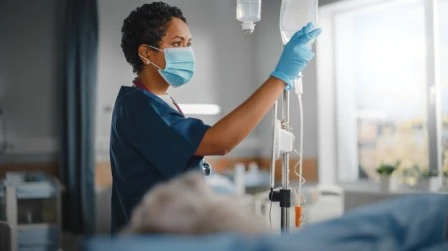
Research indicates a possible link between sleep apnea and COVID-19 risk.
In the United States, more than 18 million people suffer from sleep apnea, a disorder that makes it difficult to breathe while sleeping. Sleep apnea can lead to poor sleep hygiene and has also been linked to obesity, heart disease, hypertension, and teeth grinding. Since the onset of the COVID-19 pandemic, doctors have looked for risk factors in patients for developing severe cases of COVID-19. One possible avenue was sleep apnea and COVID-19.
Researchers from the Turku University Hospital and the University of Turku conducted a study exploring the possible link between sleep apnea and COVID-19 risk. Their results were published in Sleep Medicine and Disorders: International Journal.
The study examined Finnish patients at the beginning of the COVID-19 pandemic. By early May 2020, only 263 cases of COVID-19 were reported in Finland. Twenty-eight of these were admitted to Turku University Hospital.
In April 2020, the researchers began to track all health-related data for COVID-19 patients in Turku University Hospital. The research team statistically analyzed all of the data collected. The health-related data included weight, height, smoking history, blood pressure, heart rate, oxygen saturation, and pre-existing conditions such as diabetes, sleep apnea, high blood pressure, and COPD.
The COVID-19 patients were in the hospital for an average of 9.5 days. Of the 28 patients admitted, 25% were treated in the ICU for an average ICU stay of 19 days. Fifteen patients were discharged home, and nine were discharged to a health center. Two patients died while in the hospital and one died after being transferred to a health center.
Many of the study’s findings correlated to those from COVID-19 studies worldwide. However, the study determined sleep apnea and COVID-19 risk. Twenty-nine of the patients had sleep apnea as a pre-existing condition, while only 3.1% of the Finnish population had been diagnosed with sleep apnea.
Two sleep apnea risk factors may lead to severe cases of COVID-19: low blood oxygen levels and chronic inflammation. Doctors theorize low levels of oxygen in the blood, known as hypoxemia, could worsen during COVID-19 infection. Chronic inflammation also increases the risk for cytokine storm, a known COVID-19 risk factor.
The study also determined that patients admitted to the ICU had high levels of C-reactive protein. The data suggested that high levels of C-reactive protein was related to the blood oxygen levels and indicated a higher risk for ICU admission.
The study suggests that there is an association between sleep apnea and risk of severe COVID-19. However, due to the study size, additional research was recommended.
Written by: Rebecca K. Blankenship B.Sc.
References:
Feuth T, Saaresranta T, Karlsson A, et al. Is sleep apnea a risk factor for Covid-19? findings from a retrospective cohort study. Sleep Medicine and Disorders: https://medcraveonline.com/SMDIJ/SMDIJ-04-00075.pdfInternational Journal. 2020;4(3). doi:10.15406/smdij.2020.04.00075
Obstructive Sleep Apnea Diagnosis. Sleep Foundation. https://www.sleepfoundation.org/sleep-apnea/obstructive-sleep-apnea/diagnosis. Published September 25, 2020.
Image by mattthewafflecat from Pixabay
Related Post
 02
02 Dec
Does Ambetter Cover Virtual Mental Health Visits in Georgia?
Does Ambetter Cover Virtual Mental Health Visits in Georgia? Ambetter from the Peach State Wellbeing Plan serves underprotected and uninsured populations through Georgia Access. Ambetter from Peach State Wellbeing Plan is endorsed by Ambetter of Peach State, Inc., which is a.
Read More 18
18 Nov
Is There a Good Place to Stop Leveling Health Skyrim?
The blemish in Skyrim's evening out framework is by they way it grants capacity to the player, and capacity to the players resistance through unequivocal means. For instance, by work in abilities. Is there a good place to stop leveling health.
Read More 06
06 Nov
What Type of Cancer Did Morgan Spurlock Have?
Morgan Spurlock, the producer and previous CNN series have whose McDonald's narrative Super Size Me was selected for an Institute Grant, passed on from disease confusions Thursday, as indicated by his loved ones. What Type of Cancer Did Morgan Spurlock Have? The.
Read More 24
24 Oct
When Does Nutex health Inc Do Earnings Report Come Out?
When Does Nutex health Inc Do Earnings Report Come Out? Today announced that Nutex Health Inc., Nutex Health" or the "Company," a physician-led, integrated healthcare delivery system comprising of 21 state-of- the-art micro hospitals in 9 states and primary care-centric. The.
Read More